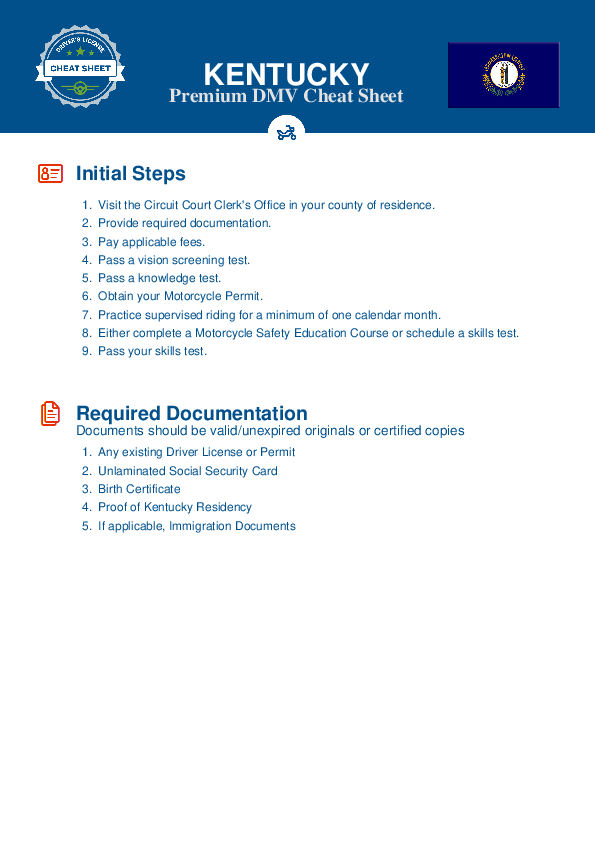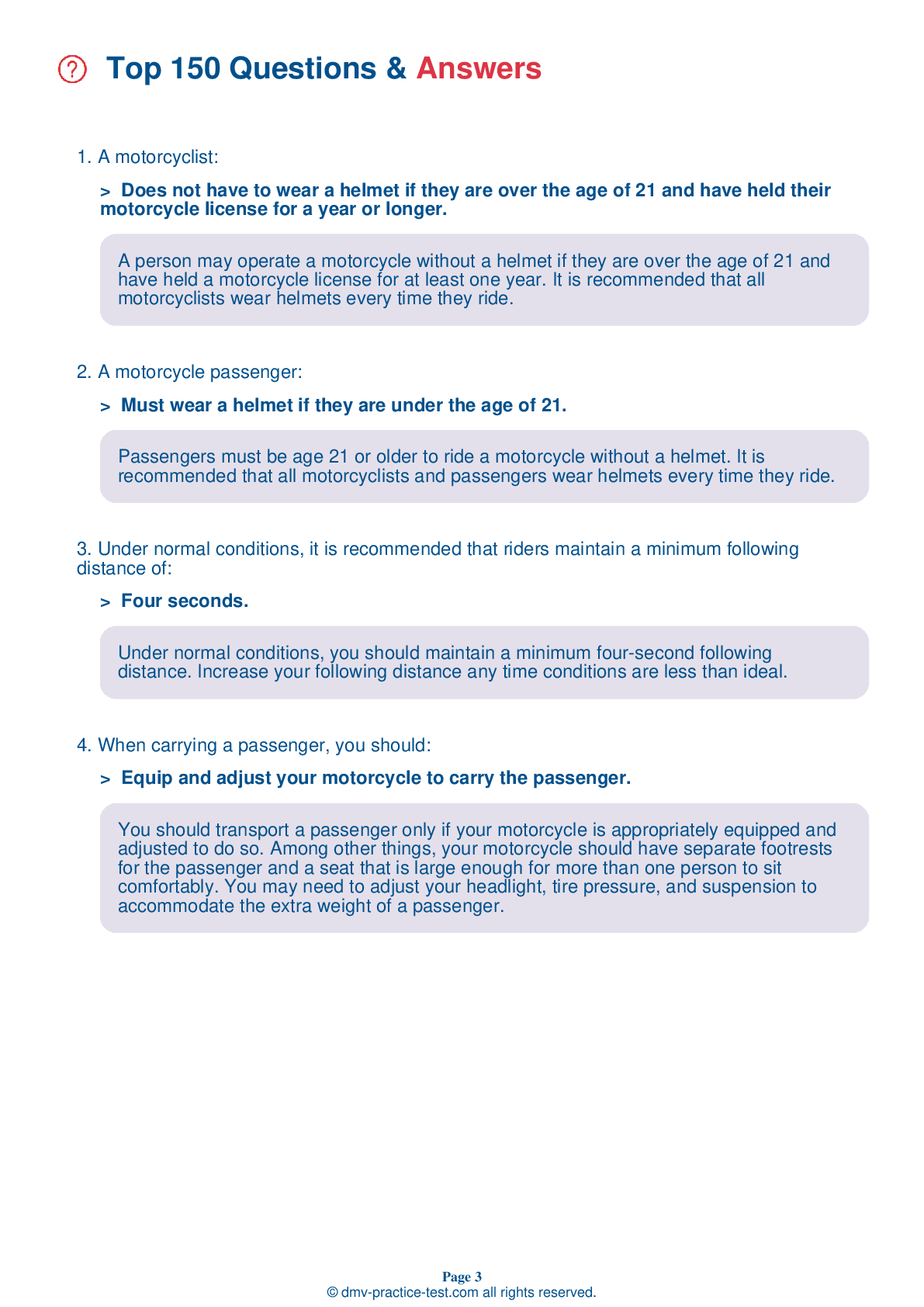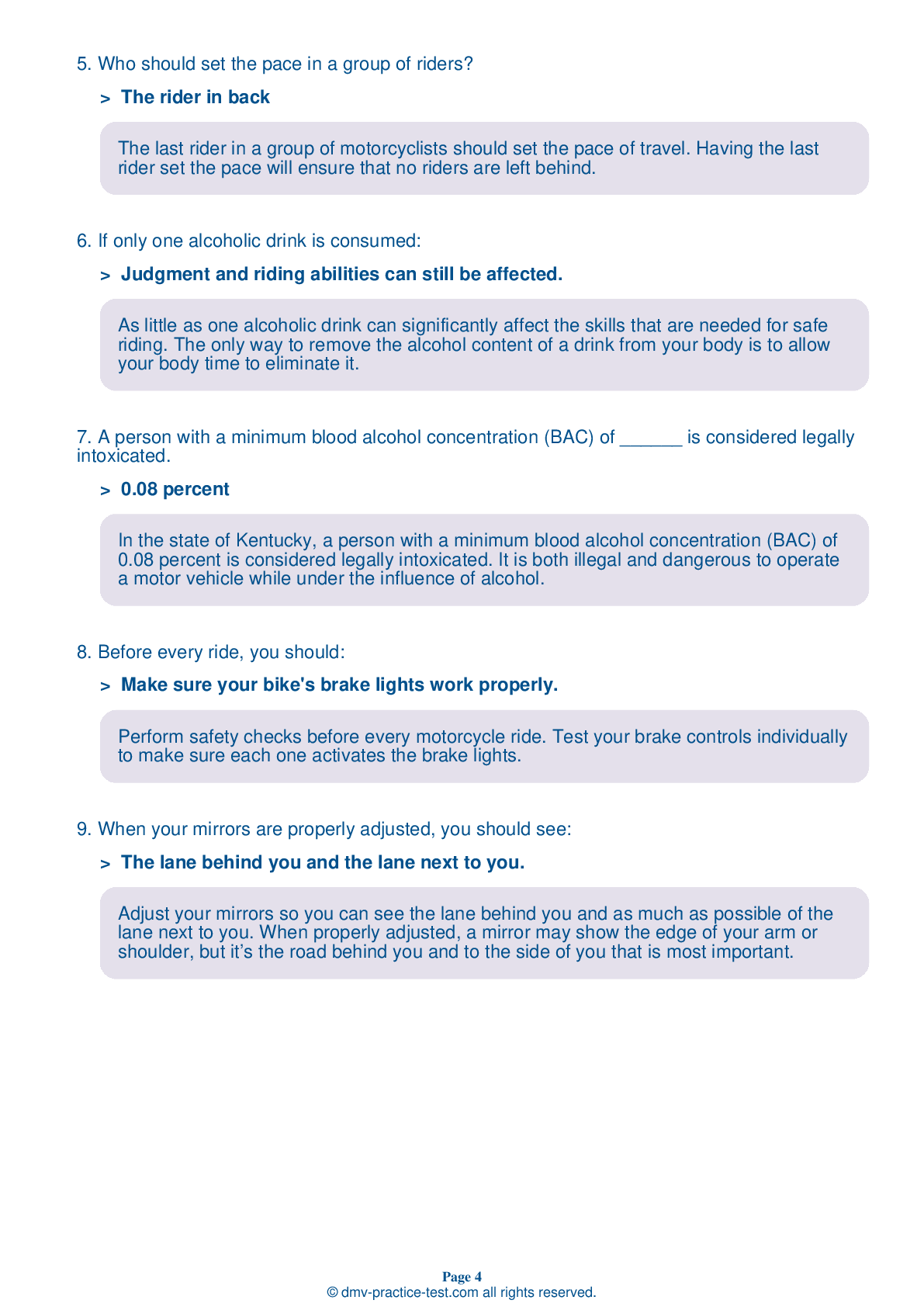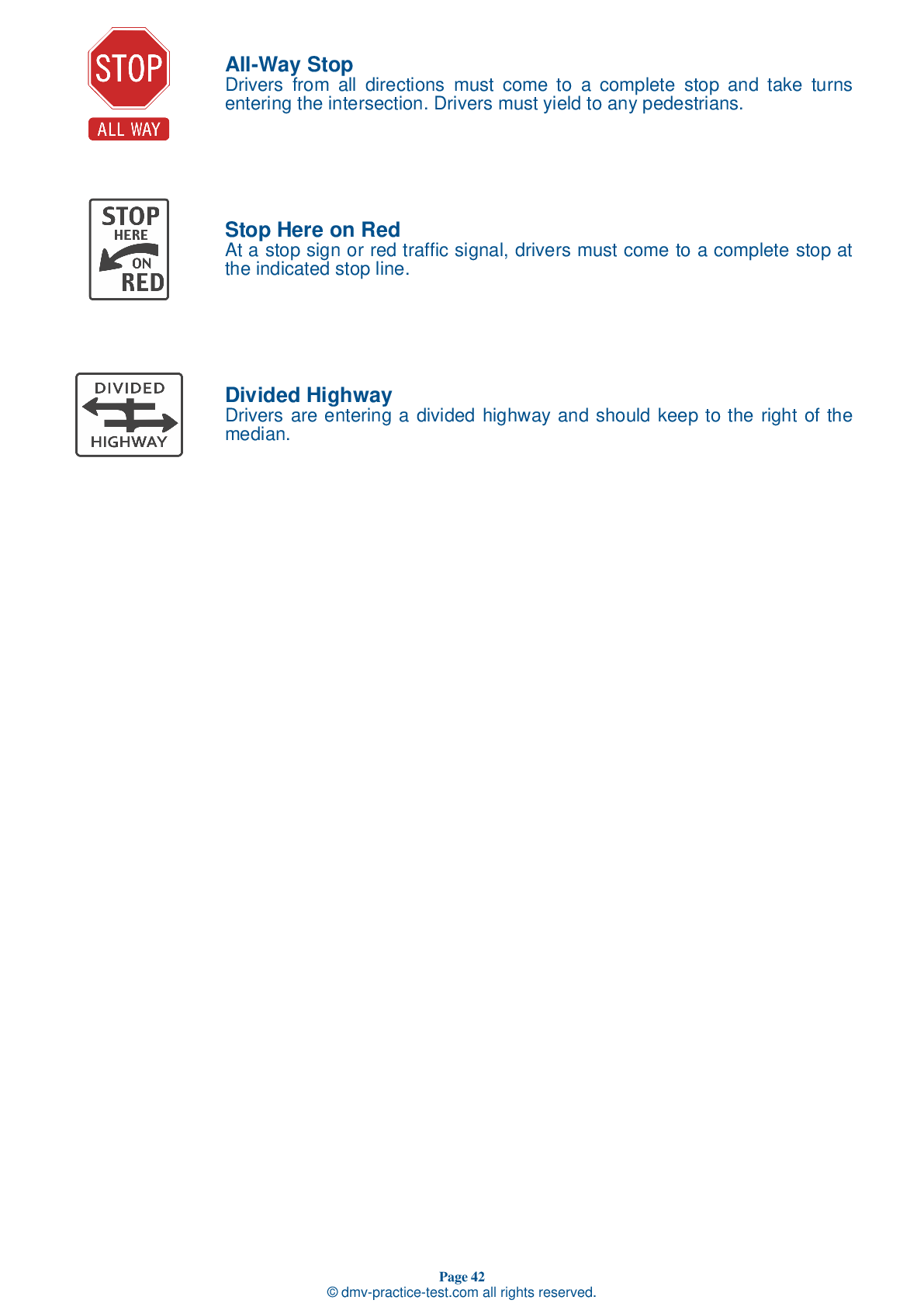DMV Permit Test #6
Motorcycle Test | License KY 2026 | FREE Online Practice! #6 Page 4 of 4
Take this FREE motorcycle test (license in KY 2026) to check your knowledge of the road rules. To improve your results, download a motorcycle handbook online, study theory, and practice for free on our website. Still worried about how to get a motorcycle license in Kentucky in 2026? Check our website for more sample tests, train as much as possible, and boost your grades!
30
24
16
22 . This sign shows one type of:
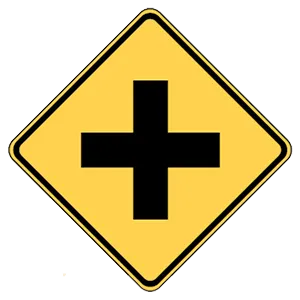
Lane change.
This sign indicates that an intersection with a crossing road is ahead.
23 . When passing a row of parked cars to your right when there is no oncoming traffic to your left, you should:
Use your rearview mirrors more frequently than usual.
When passing a row of parked cars, it is generally best to stay on the side of your lane that is not directly next to the cars. This will help to protect you from potential hazards like car doors being opened or people stepping out from between the cars. If there is traffic coming from the opposite direction, it is a good idea to stay in the center portion of the lane.
24 . You should do a pre-ride inspection:
Once a season.
A small technical fault can have much more serious consequences on a motorcycle than on a car. To avoid these consequences, inspect your motorcycle before every ride.
25 . When a vehicle attempts to pass you from behind, you should:
Not be concerned about which portion of the lane you are using.
When being passed, it is generally best to ride in the center portion of your lane. Being too close to the passing vehicle increases the risk of a collision.
26 . To reduce your reaction time, you should:
Ride under the speed limit.
In potential high-risk areas, such as near intersections, shopping areas, school zones, and construction zones, cover the clutch and both brakes to reduce the time you will need to react to potential hazards.
27 . A proper lane position can help you do all of the following, except:
Set up for turns.
Your lane position affects a number of factors that are important to your safety on the road. Among other things, your position should help you increase your ability to see and be seen, avoid other drivers' blind spots, and set you up for any turns you plan to make.
28 . When a group of riders is passing another vehicle on a two-lane road, the riders should:
Pass at one time as a group.
On a two-lane road, a group of motorcyclists should pass one at a time. Each motorcyclist should complete the pass before another begins to pass.
29 . An engine will seize due to:
Improper tire inflation.
Engines seize when they are low on oil. Without oil, the engine’s moving parts cannot move smoothly against each other and the engine overheats.
30 . When adjusting your mirrors, you should focus on:
The side of the motorcycle.
Adjust your mirrors so you can see the lane behind you and as much as possible of the lane next to you. When properly adjusted, a mirror may show the edge of your arm or shoulder, but it’s the road behind you and to the side of you that is most important.
2026 Kentucky | Frequently Asked Questions
To acquire a motorcycle driver's license in Kentucky, you must first obtain a motorcycle permit by passing a written test. After holding the permit for a month, you can take the road skills test to get your license. If you're under 18, you must also complete a motorcycle safety education course. All applicants must pay the necessary fees.
In Kentucky, the minimum age for obtaining a motorcycle driver's license is 18 years. However, if you're under 18, you can get a motorcycle permit after completing a driver's education course. This permit allows you to ride under certain restrictions for practice before taking the test for the full motorcycle license.
Yes, you do need a dedicated license to legally ride a motorcycle in Kentucky. This is often called a motorcycle endorsement and is added to your regular driver's license. To obtain this, you must pass a written test and a skills test. The purpose is to ensure that you understand the unique safety issues related to motorcycle operation.
To apply for a motorcycle driver's license in Kentucky, you'll need proof of identity (like a birth certificate or passport), proof of Social Security number (like a Social Security card or W-2 form), and proof of Kentucky residency (like a utility bill or lease agreement). If you're under 18, you'll also need a parental consent form.
Yes, you will need to take a written exam to get a motorcycle license in Kentucky. The test is designed to assess your knowledge of motorcycle operation, traffic rules, and safety procedures. This is a mandatory step in the licensing process and cannot be waived, even if you've completed a motorcycle training course.
The motorcycle written test in Kentucky covers topics such as road rules, traffic signs, and motorcycle safety. It tests your knowledge on operating a motorcycle, including handling emergencies and braking techniques. You'll also be tested on specific laws related to motorcycle use in Kentucky. The Kentucky Motorcycle Operator Manual is a good resource to prepare for the test.
No, in Kentucky, the motorcycle training course does not substitute the written test. The written test is mandatory to obtain a motorcycle permit or license. However, completion of a Motorcycle Safety Education Course may waive the skills test, but the written exam is still required to ensure understanding of road rules and safety.
To enroll in a motorcycle training course in Kentucky, you need to find a state-approved school offering the course. Contact the school directly to register. They'll provide details about the course schedule, fees, and what you need to bring. Most schools require you to have a motorcycle permit before starting the course. Completing the course can sometimes help waive the road test for your license.
No, you do not have to own a motorcycle to take the license test in Kentucky. You can borrow a motorcycle as long as it is registered, insured, and meets all safety requirements. However, if the owner is not present during the test, you must provide written permission from the owner to use it.
Yes, you can use a friend's motorcycle for the driver's license evaluation in Kentucky. However, the motorcycle must be properly registered, insured, and meet all safety standards. Also, ensure you are comfortable and familiar with the bike's controls and operations to successfully pass the test.
Yes, the Kentucky motorcycle driving exam tests specific handling skills. These include the ability to control the motorcycle during low-speed maneuvers, sudden stops, and turns. It also tests your ability to change lanes safely, navigate through intersections, and maintain proper positioning on the road. You must demonstrate these skills proficiently to pass the exam.
Yes, new motorcycle drivers in Kentucky with a permit face several restrictions. They are not allowed to ride after dark, carry passengers, or ride on the interstate. These limitations are lifted once the rider passes the road test and obtains a full motorcycle license. The goal of these restrictions is to ensure new riders gain experience safely.
Yes, your Kentucky motorcycle license is valid throughout the United States. All states recognize out-of-state motorcycle licenses, so you're free to ride across state lines. However, be aware that traffic laws and helmet requirements may vary from state to state. Make sure to familiarize yourself with the rules of the road in each state you plan to ride in.
In Kentucky, motorcycle helmet laws require all riders under 21, novice riders, and those with instructional permits to wear a helmet. However, for riders over 21 who have been licensed to operate a motorcycle for more than one year, wearing a helmet is not mandatory. Nonetheless, wearing a helmet is always recommended for safety reasons.
Yes, Kentucky offers two types of motorcycle licenses. The Motorcycle Permit allows you to ride under certain restrictions, perfect for beginners. The Motorcycle License, which requires passing a road test, provides full riding privileges. There's also a Motorcycle Only License for those who don't have a regular driver's license. Each type requires passing a written test and vision screening.
Yes, in Kentucky, you can add additional endorsements to your motorcycle license. These could include endorsements for operating different types of motorcycles or for towing trailers. To obtain an endorsement, you typically need to pass both a written test and a skills test related to the specific endorsement.
Yes, the Kentucky motorcycle license test can be taken in multiple languages other than English. It's advised to contact your local DMV office to confirm the availability of the test in your preferred language. Some locations may also permit the use of translator or interpreter services during the test.
An effective strategy for preparing for the motorcycle license test in Kentucky involves studying the Kentucky Motorcycle Operator Manual thoroughly. This manual covers all the information needed for the test. Additionally, taking online practice tests can help familiarize you with the format of the exam and identify areas you need to focus on.
Yes, the Kentucky motorcycle written exam is available in several languages other than English. However, it's recommended to contact your local DMV office to verify the availability of specific languages. Additionally, some locations may offer the use of a translator or interpreter service during the test.
Yes, retaking is allowed. If you fail the motorcycle written test in Kentucky, you can retake it. However, you must wait at least one day before retesting. It's recommended to review the Kentucky Motorcycle Manual and take some practice tests before your next attempt to increase your chances of passing.
